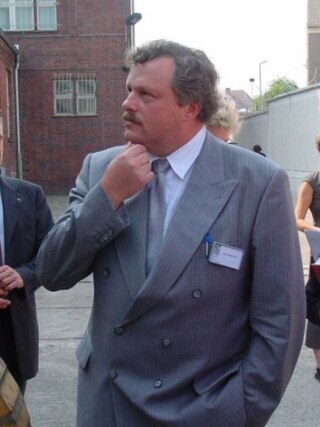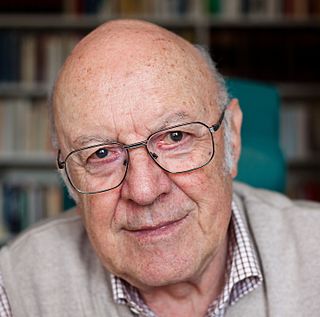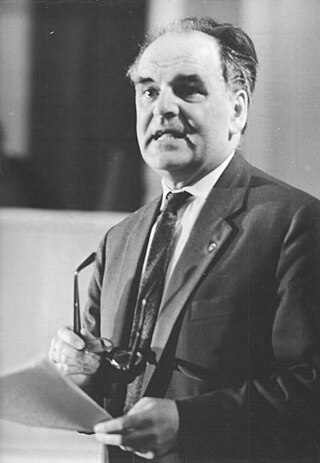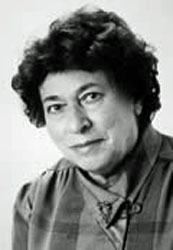Related Research Articles

Siegfried Reiprich is a German human rights activist and author. He was involved in the resistance against the communist regime of the German Democratic Republic (GDR), which led to him being expelled from university and eventually banished from the GDR. In 2009, he was appointed by the Government of Saxony as the Director of the Stiftung Sächsische Gedenkstätten. In 2011, he was elected as a member of the Executive Board of the Platform of European Memory and Conscience.
Ulrich Woronowicz was an East German Protestant theologian and writer.

Zersetzung was a psychological warfare technique used by the Ministry for State Security (Stasi) to repress political opponents in East Germany during the 1970s and 1980s. Zersetzung served to combat alleged and actual dissidents through covert means, using secret methods of abusive control and psychological manipulation to prevent anti-government activities. People were commonly targeted on a pre-emptive and preventive basis, to limit or stop activities of dissent that they may have gone on to perform, and not on the basis of crimes they had actually committed. Zersetzung methods were designed to break down, undermine, and paralyze people behind "a facade of social normality" in a form of "silent repression".

Helmut Müller-Enbergs is a German political scientist who has written extensively on the Stasi and related aspects of the German Democratic Republic's history.
An unofficial collaborator or IM, or euphemistically informal collaborator, was an informant in the German Democratic Republic who delivered private information to the Ministry for State Security. At the end of the East German government, there was a network of around 189,000 informants, working at every level of society.
Jens Gieseke is a German historian. His work is focused on the German Democratic Republic and its Ministry for State Security.

Thomas Ammer was a German historian who as a young man studied to become a physician. He was arrested and imprisoned in 1958 for anti-government political activism in East Germany and he never qualified as a medical doctor. His 15-year prison sentence was cut short in August 1964 when his release was purchased by the West German government, and at the age of 27 he relocated to the German Federal Republic.

Karl Wilhelm Fricke is a German political journalist and author. He has produced several of the standard works on resistance and state repression in the German Democratic Republic (1949–1990). In 1955, he became one of several hundred kidnap victims of the East German Ministry for State Security, captured in West Berlin and taken to the east where for nearly five years he was held in state detention.
Bernd Eisenfeld, also known by the pseudonym Fred Werner, was an opponent of the East German dictatorship who became a writer and an historian.
Horst Bartel was a German historian and university professor. He was involved in most of the core historiography projects undertaken in the German Democratic Republic (1949–1989). His work on the nineteenth-century German Labour movement places him firmly in the mainstream tradition of Marxist–Leninist historical interpretation.

Ernst Engelberg was a German university professor and Marxist historian.
Hans Mottek was one of the most important economic historians of the DDR.
Erich Bär was a resister against Nazism and later lieutenant colonel of Ministry of State Security (Stasi) of the GDR. He was, from 1957 to 1972, head of the executive offices of the Stasi in East Berlin.
Katja Havemann is a German civil rights activist and author.
Theodora Büttner is a retired East German historian. For many years she was a professor at the Karl Marx University in Leipzig. Much of her own research was focused on the precolonial history of Africa and on the anti-colonial liberation movements.

Ingeborg Weber-Kellermann was a German folklorist, anthropologist and ethnologist. She was an academic teacher, from 1946 at the German Academy of Sciences at Berlin in East Berlin and from 1961 at the University of Marburg.

Stefan Wolle is a German historian. A focus of his socio-historical research is on the German Democratic Republic which is where, before reunification, he lived and worked.

Martin Böttger was a prominent civil rights activist in East Germany. He was a member of the Landtag of the Free State of Saxony from 1990 to 1994 and led the faction of Alliance '90/The Greens.

Stephan Krawczyk is a German writer and songwriter. Before 1989 he was a noted East German dissident.
The Museum for German History was the central historical museum of the German Democratic Republic (GDR), established in 1952 and closed in 1990.
References
- ↑ Andreas Molitor (June 2012). "Der Unangepasste: Die DDR verweigerte Ilko-Sascha Kowalczuk ein Studium. Dann kam die Wende. Er studierte Geschichte und seit 2001 arbeitet er in der Stasi-Unterlagenbehörde. Mittlerweile schreibt er ein Buch über den Überwachungs-Apparat". Hans-Böckler-Stiftung, Düsseldorf . Retrieved 3 November 2014.
- ↑ Lang-Lendorff, Antje (17 March 2017). "Stasi-Historiker Kowalczuk im Interview: "Ich hatte immer 'ne große Fresse"". Die Tageszeitung: Taz.
- 1 2 3 4 Behörde des Bundesbeauftragten (BStU). "Dr. Ilko-Sascha Kowalczuk: Projektleiter/Fachkoordinator im Fachbereich 1 der Abteilung Bildung und Forschung" . Retrieved 3 November 2014.
- ↑ "Der Zweifler – brand eins online".
- ↑ Annett Mautner (interviewer) (3 September 2014). "Die Forschung lebt von Überraschungen". Das Ministerium für Staatssicherheit hat eifrig Telefonate abgehört, mitgeschnitten und Informationen für die geheimpolizeiliche und geheimdienstliche Arbeit genutzt. Acht Jahre lang haben Ilko-Sascha Kowalczuk und Arno Polzin von der BStU recherchiert – im September erscheint im Verlag Vandenhoeck & Ruprecht ihr Buch "Fasse Dich kurz! Der grenzüberschreitende Telefonverkehr der Opposition in den 1980er Jahren und das Ministerium für Staatssicherheit". Der Historiker spricht mit Annett Mautner über seine Forschungsarbeit und seine mit dem Thema verbundenen Biografie. MITTELDEUTSCHER RUNDFUNK, Leipzig. Retrieved 15 January 2015.
{{cite web}}:|author=has generic name (help) - ↑ 30 Jahre Friedliche Revolution und Deutsche Einheit Federal Ministry of the Interior, Building and Community, press release of 3 April 2019.